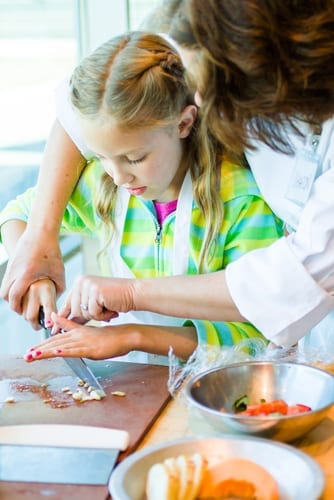As a parent, you have the privilege and responsibility of teaching your kiddos valuable knowledge and life skills. These will help your kids become more conscientious citizens, as well as self-reliant adults. As you teach your children these virtuous and practical lessons, you also create a bonding experience. From basic lessons to specialized skills, here are some activities that can be both life lessons and bonding experiences.
Cooking
Teach your child the joys of cooking or baking. These skills will come in handy during childhood and adulthood. Have your child sit in the kitchen while you cook dinner and introduce her to what your family will be eating that evening. It is important that children know the names of various vegetables and what a well-balanced meal entails. A greater knowledge of food will also promote more informed decisions when she must make food choices on her own. Let your child help with any prep work that doesn’t require dangerous tools or sharp knives. The Food Network website has a “Cooking With Kids” section that will give you ideas for kid-friendly cooking and baking projects. As you child enters her teenage years, increase her responsibility in the kitchen; have her take charge of a side dish or main dish of your family’s dinner.
Car Maintenance
Vehicle care and safety are important for teenagers to know, before they become self-reliant drivers. Take your teenager out with you, when you get your oil changed or your tires changed, so he understands why you must take certain maintenance measures with a car. At the gas station, show your teen how he can check tire pressure and fill tires as needed. Explain why purchasing name-brand tires, tire rotation, tread wear and air level is imperative for safe driving. When you must pump gasoline, or put other fluids into the car, like windshield fluid or antifreeze, have your child help with the process.
Physical Activity
While your child may be involved with school or club sports teams, your influence in the realm of physical fitness could steer her toward a healthy, long-term lifestyle. Make a family exercise schedule that you know you can stick with, which entails planned physical activity at least three times per week. Activities could include neighborhood walks, games of tennis, running a mile around the local, high school track, or a day trip up to the mountains for a ski session. Keep a laminated, activity calendar on the fridge that allows you to make a visible, weekly schedule of your family’s recreational plans. Organize physical-fitness contests among the family that will reward individuals, as well as the entire family, when they reach fitness goals. For example, if everyone in the family has a pedometer, keep track of the number of steps you individually take every day. A family trip or another fun prize can be the reward once the entire family has made their pedometer goals.
Volunteer Work
Children inherently have a difficult time seeing beyond their own situation or experience. It may be difficult for your child to recognize that they are part of a community and have a responsibility to contribute to the well-being of society. Teach your child about the fundamental values of altruism and what it means to “give back.” Involve your family in local food drives, charitable walks or other community projects. The exposure to less fortunate individuals and an engagement in volunteer activities will teach your child that he can make a positive difference. The Greater Good program, from UC Berkeley, has further methods and ideas for the cultivation of kindness in kids and teenagers.











